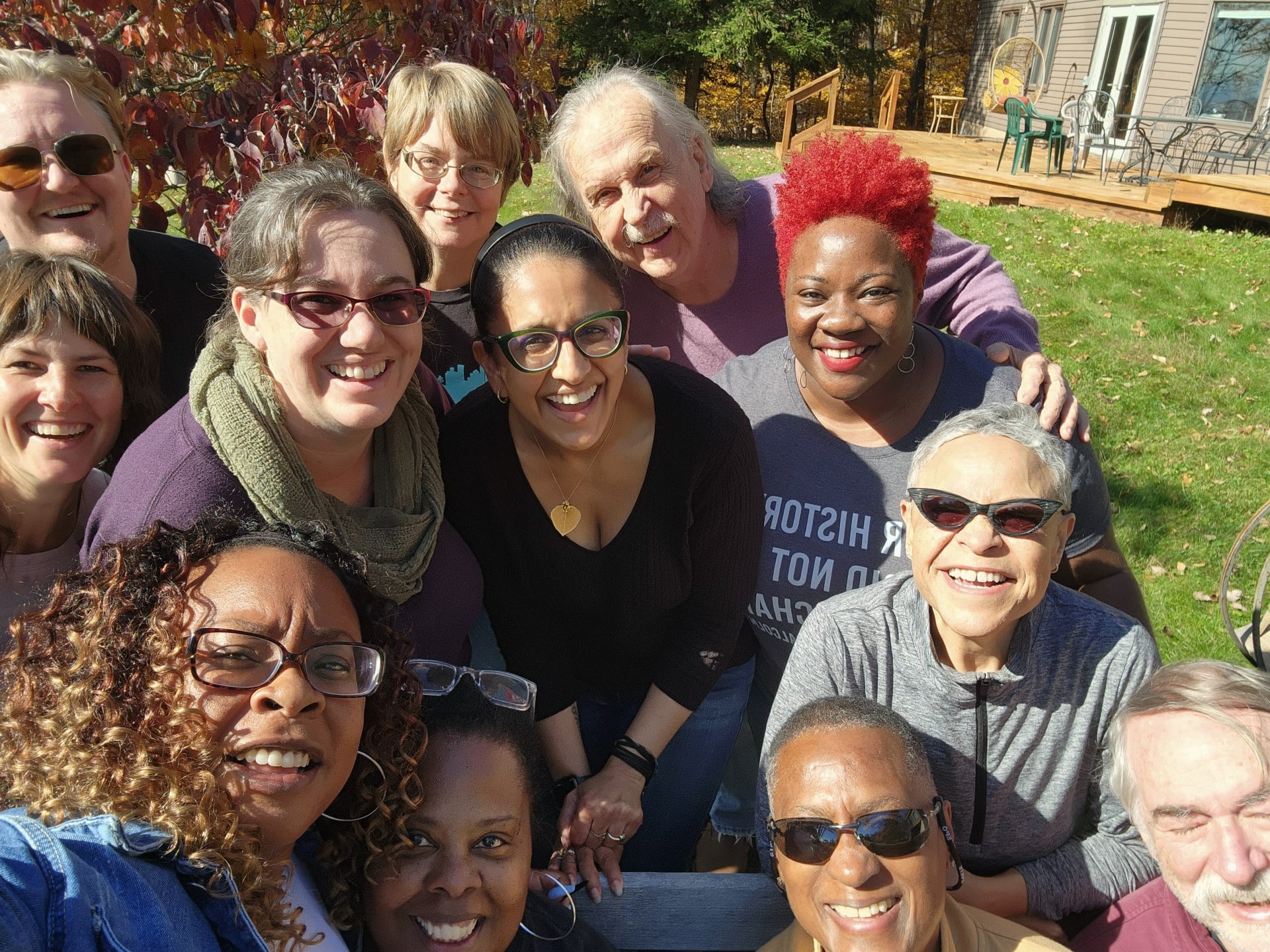By Nichola Torbett
“Why didn’t I do something sooner?”
That was the question I kept asking myself when the racial healing retreat here at Kirkridge ruptured last week.
It was almost but not quite the right question.
The rupture, as it turned out, was the precursor to real intimacy and a way forward that is both more real and right and also more humbling and challenging. But we didn’t know that right away.
Very soon after the thirteen of us–eleven invited participants plus two facilitators assigned by the outside organization we were working with; seven of us white, five Black, one South Asian–gathered for the opening session, it became clear that this was no ordinary group. The opening circle where we voiced our hopes and fears was deep, vulnerable, raw, and full of longing for a truthful conversation too long delayed and too often silenced. We were all people who have been working against white supremacy for a long time, and we were gathered to discern together how Kirkridge might best serve that work.
We were about an hour and a half in when the white facilitator interrupted the Black facilitator while she was leading to express concern about time. The white facilitator wondered aloud whether we might need to cut the activity the Black facilitator had started in order to get through the whole agenda. I felt something in my body at that moment–a contraction in my gut. It felt like a microaggression.
I know from my own white conditioning what it is like to feel like you have to keep a group on track. I also know the anxiety of facilitating a multiracial group as a white person with a co-facilitator I don’t know well. I could easily have done what that white facilitator did. But I also knew that it undercut the Black facilitator’s authority in that room, subtly suggesting that the white facilitator was really in charge. It also suggested that, once again, an agenda was going to be used to shut down challenges from BIPOC (Black, Indigenous and People of Color) participants that make white facilitators anxious. I have no doubt used agendas that way myself.
I did not do anything in that moment to address what had happened, nor did I do anything later when I heard the same white facilitator urging two Black participants to stop what they were doing so the group could re-gather, even though I again felt a warning zing in my body. Even though I was the convener of the gathering and had a lot of power in the situation, I did not do anything. Looking back on it, I realized I was hoping the issues would “take care of themselves.”
How often have I stayed silent and done nothing, fearing conflict, fearing awkwardness, hoping that things would take care of themselves?
Whiteness is not going to take care of itself. Or rather, it will take care of its own. But it will not dismantle itself. And while I vainly hope it will, BIPOC people are harmed, shut down, shut out, and worse.
By evening, it was clear that things were going awry. The group self-segregated at dinner, white folks at one table, BIPOC folks at another. I stopped by the BIPOC table to invite everyone to the planned storytelling circle that was about to start, but I could feel it might not be what this group needed, so I let them know we’d love to have them there but that there was no pressure.
A while later, while the white folks were exchanging stories, I got a call. The BIPOC affinity group wanted to talk with me. They did not feel they could go forward with any trust in the white facilitator. In addition to what I had witnessed, some other things had happened, which I will enumerate here for the learning of white people who might be reading this. I am not listing these to shame that facilitator; any of us white people might have made any of these mistakes. They are rooted in white patterning that we have been socialized into since birth:
- Asking for repeated hugs and emotional support from a Black pastor (who does have a huge heart and is generous with care) whom they had not met prior to this retreat; there is a cultural expectation that BIPOC and especially Black people take care of white people and our feelings
- Out of anxiety and likely out of real care, asking a Black participant to leave out the back way to avoid having to walk past the white affinity group. This privileges the white group and asks a Black person to inconvenience themselves while inadvertently using a phrase (“the back way”) that conjures up servanthood, enslavement, Jim Crowe, and segregation
- Taking, rather than asking for, time from BIPOC people in order to check in about the above
- Presuming welcome and pulling up a chair at the BIPOC table while they were discussing these matters and then, after having been asked to leave, continuing to move around the room, making the group feel surveilled.
- Announcing, in front of the BIPOC group, how the morning’s agenda would go, again undermining the authority of the Black facilitator
After some conversation, it became clear that I needed to ask the white facilitator to leave, and that it was not going to be possible even for them to come in the morning to say goodbye without the BIPOC participants feeling they had to take care of their feelings.
As someone who hates confrontation and fears hurting people’s feelings, I did not want to ask this person to leave. I knew it was going to hurt them. How often have I avoided necessary confrontation? How often have I unthinkingly privileged the feelings of white people over the real urgent needs of BIPOC people? Whose feelings matter and whose do not?
As it turned out, Lydia, our executive director, fully backed me and came along to deliver this hard news. And that catalyzed some important learning for me.
The question I needed to be asking was not just “Why didn’t I do something sooner?” but “Why haven’t we done something sooner?” In the moment of first discomfort, it did not occur to me to check in with others to see how the interruption had landed for them. It didn’t occur to me to look around the room to catch the eye of other white antiracists who might also feel uncomfortable.
And this is the call we heard from the BIPOC participants later in the retreat as we unpacked what had happened. One Black woman said, “When I enter a room, I am already looking for the other Black people there, and I’m trying to make eye contact with them, trying to see who is going to have my back and who is too colonized to do so. White people, maybe you need to do the same. Who are the other decolonized/ing white people in the room who can help you if something goes awry?”
We talked a lot about how individualism is part and parcel of white supremacy culture and how it keeps us from reaching for one another. Later, in the white affinity group, we made “community agreements” among ourselves not to throw each other, or the white facilitator, under the bus; not to split into the “good ones” and the “shameful ones,” but instead to call each other into white antiracist community where we know we are going to make mistakes and can support each other to make things right. We developed cues to remind each other to get back in our bodies and to signal when white supremacy starts to take over the room. We committed to having each other’s backs as we intervene.
In addition to growing trust, so much fertile planning came out of our multiracial debriefing of this painful, hard time. Among our plans are the formation of a white online practice group where we will work on staying in our bodies, noticing when something feels off, and speaking up or taking action, with support, when it is needed. The BIPOC group wondered aloud, “What if you had 500 white people who were prepared and connected in this way?” So that is our goal. It will take a while to reach it. We have six right now, but we’re growing.
If you are interested in such a practice group, please reach out. You can contact me at nicholat@kirkridge.org. We also have plans for two in-person retreats in 2024 for white people at all levels of experience who want to improve their ability to intervene.
In addition, we are planning a BIPOC decolonial self-care retreat; a BIPOC LGBTQ+ retreat on healing through writing and art; a number of other decolonial retreats; a series of blog posts from other participants from last week’s powerful retreat so that you get to hear other perspectives on what happened; humble steps toward relationship with the Lenape people indigenous to this place; and a set of practices and commitments that we will work with as a staff, board, and community and that we will also urge all our retreat leaders to incorporate.
And this is just the beginning, the first humble moves based on where and who we are. There is much more to do. I am so grateful to this group of incredible people who hung in there through painful, difficult, profoundly important conversations last week and who remain committed to the work going forward. I am excited about who we might become together!

